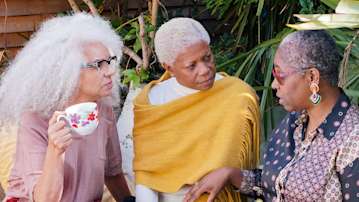Why are ‘first times’ so tricky?
‘These events or occasions are a connection between the past and the present,’ says Caspar Williams of Cruse Bereavement Care. ‘They remind of you of who you’ve lost and what you’ve lost.’
Linda Magistris, chief executive and founder of The Good Grief Trust says first times can make you feel like your future has been taken away. ‘It’s a reminder of all the plans you were making, as a couple or a family,’ she says. ‘These occasions aren’t just a reminder of your loss but the future you’ve lost, too.’
Preparing for special occasions
Many of us want to ignore these first times because they can be so painful. Julia Samuel, psychotherapist and author of Grief Works, says, ‘Our natural instinct is to try to pretend it isn’t happening, squashing down those feelings, which doesn’t work.’ But consciously acknowledging that the day is coming up can help you feel more in control of your emotions.
Don’t worry if you’re not feeling sad on these occasions. Grief is very different day to day, so you might actually be OK on the day itself. If that happens, don’t feel guilty if you don’t get upset. ‘You might worry that if you’re not feeling sad, it means you didn’t love them enough,’ Caspar says. ‘But that’s a normal, healthy way to feel.’
Marking the occasion
If you do want to remember your loved one during a significant ‘first time’ – and it’s OK if you don’t – there are a number of ways you could do so.
Julia recommends finding a focus for your grief. ‘Try lighting a candle, reading some poetry, or writing a letter to your loved one,’ she says. Writing down your thoughts and feelings, and physically looking at them on paper, means you can see them from a different perspective, which helps you process them.
Another idea is creating a memory box. ‘Put in photos, drawings, or mementos, like shells from a beach,’ Linda says. You could start the box on this first occasion then add to it over the years, bringing it out for special events (or whenever you want to) to remember your loved one.
Accepting help
After the death of a loved one, it’s normal to feel lost or alone. It might feel as if no one else understands what you’re going through. The journey we go on whilst grieving is deeply personal. Remember that there is help out there that you could benefit from.
It is common to shut out friends and family when grieving, it takes courage and strength to admit you need help. It isn’t a sign of weakness. Trying to take on everything by yourself and avoiding asking for help could lead to you feeling overwhelmed, exhausted and even more anxious.
When we think about the different stages of grief, acceptance is often talked about as the final stage. It can take time to adjust to the reality of a future without someone you love in your life.
Whether you reach out to family and friends or seek professional support, talking about how you’re feeling can help you process your feelings and find healthy ways of coping with grief. By talking about your feelings, you can begin to establish steps that help you deal with bereavement long term, beyond the first birthday, Christmas or anniversary without a loved one.
Help a friend dealing with grief
Supporting a friend through their grief is important, but don’t push them. ‘With the best intentions, friends can go into solution-focused help, such as “You should try this or that”,’ says Caspar. ‘Instead, just be there for them, and listen to what they say without judgement.’ If you’re not sure how to respond, something simple like ‘that sounds really tough’ shows you’re actively listening.
The fear of saying the wrong thing can stop many of us reaching out. ‘We end up saying nothing, which can make the bereaved person feel like their loved one has been forgotten,’ says Linda.
She recommends looking through your phone or social media for pictures of the person who has died, putting them together in a book, and giving it to your friend on the day. ‘They may never have seen these photos before, so it’s lovely for them to see a different side to their loved one,’ she says. ‘It also shows you still remember them.’
Whatever you do for the ‘first time’ following a bereavement is completely up to you. ‘There are no rules,’ says Linda. ‘The main thing is not to put too much pressure on yourself to feel or behave a certain way.’
Learning to live with grief
There is no set timeline for how long grief lasts. The death of a loved one is one of the toughest things a person can experience in life. What follows may feel like an emotional rollercoaster – one day you might feel fine, the next you might feel consumed by grief. In this sense, it may be more useful to think about grief as something that will always be there, rather than something to ‘get over’. It may fade over time, but it will always be there.
The first step in learning to live with grief is to redefine how you understand grief. The grieving process doesn’t follow a set format. One person’s response to grief will be completely different to the next person. Other factors like your relationship to the person that died, how they died, and your age at the time of death, will also have a huge impact in your response to grief.
Birthdays, Christmas and anniversaries are always likely to be triggering events. What you can do is prepare for these events and take part in regular rituals that make you feel in control and ensure your memory of that person lives on.
If you do want some support, contact a friend, family member or one of the organisations below. To help children dealing with bereavement, read our guide, or get more advice for talking to children about bereavement.




